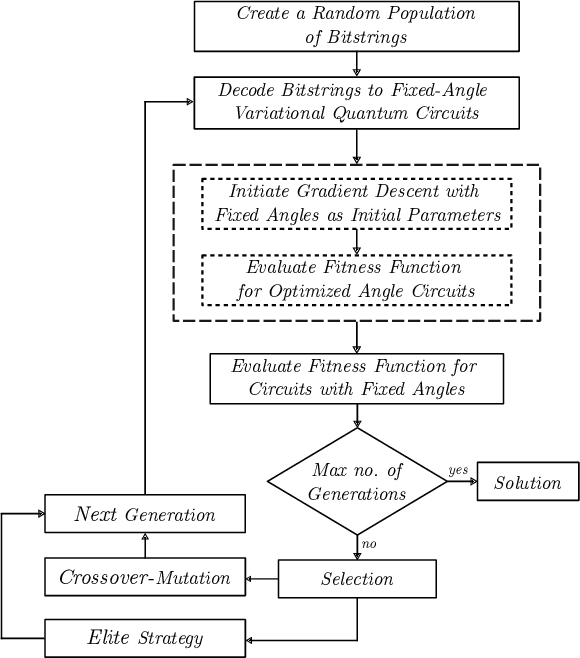Diego H. Useche
MEMO-QCD: Quantum Density Estimation through Memetic Optimisation for Quantum Circuit Design
Jun 14, 2024



Abstract:This paper presents a strategy for efficient quantum circuit design for density estimation. The strategy is based on a quantum-inspired algorithm for density estimation and a circuit optimisation routine based on memetic algorithms. The model maps a training dataset to a quantum state represented by a density matrix through a quantum feature map. This training state encodes the probability distribution of the dataset in a quantum state, such that the density of a new sample can be estimated by projecting its corresponding quantum state onto the training state. We propose the application of a memetic algorithm to find the architecture and parameters of a variational quantum circuit that implements the quantum feature map, along with a variational learning strategy to prepare the training state. Demonstrations of the proposed strategy show an accurate approximation of the Gaussian kernel density estimation method through shallow quantum circuits illustrating the feasibility of the algorithm for near-term quantum hardware.
Quantum Measurement Classification with Qudits
Jul 20, 2021



Abstract:This paper presents a hybrid classical-quantum program for density estimation and supervised classification. The program is implemented as a quantum circuit in a high-dimensional quantum computer simulator. We show that the proposed quantum protocols allow to estimate probability density functions and to make predictions in a supervised learning manner. This model can be generalized to find expected values of density matrices in high-dimensional quantum computers. Experiments on various data sets are presented. Results show that the proposed method is a viable strategy to implement supervised classification and density estimation in a high-dimensional quantum computer.
Prostate Tissue Grading with Deep Quantum Measurement Ordinal Regression
Mar 04, 2021



Abstract:Prostate cancer (PCa) is one of the most common and aggressive cancers worldwide. The Gleason score (GS) system is the standard way of classifying prostate cancer and the most reliable method to determine the severity and treatment to follow. The pathologist looks at the arrangement of cancer cells in the prostate and assigns a score on a scale that ranges from 6 to 10. Automatic analysis of prostate whole-slide images (WSIs) is usually addressed as a binary classification problem, which misses the finer distinction between stages given by the GS. This paper presents a probabilistic deep learning ordinal classification method that can estimate the GS from a prostate WSI. Approaching the problem as an ordinal regression task using a differentiable probabilistic model not only improves the interpretability of the results, but also improves the accuracy of the model when compared to conventional deep classification and regression architectures.
 Add to Chrome
Add to Chrome Add to Firefox
Add to Firefox Add to Edge
Add to Edge